
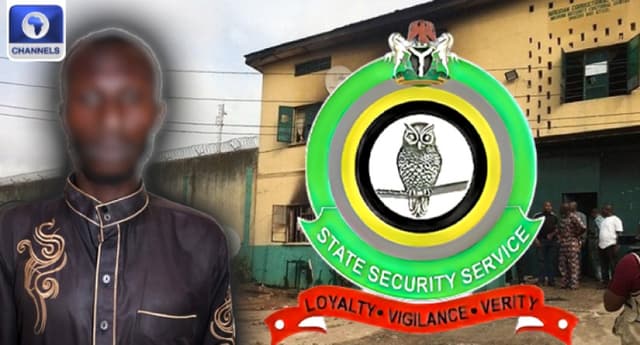
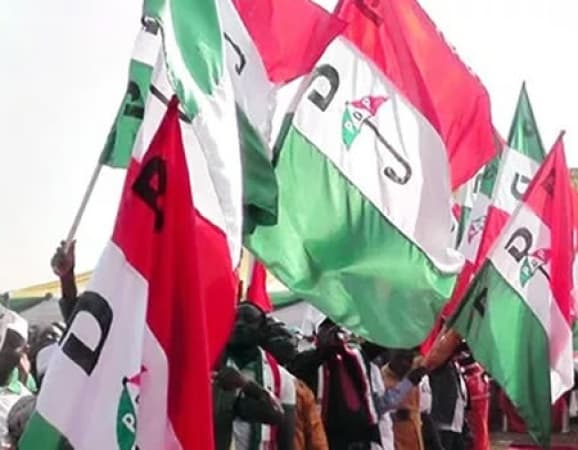
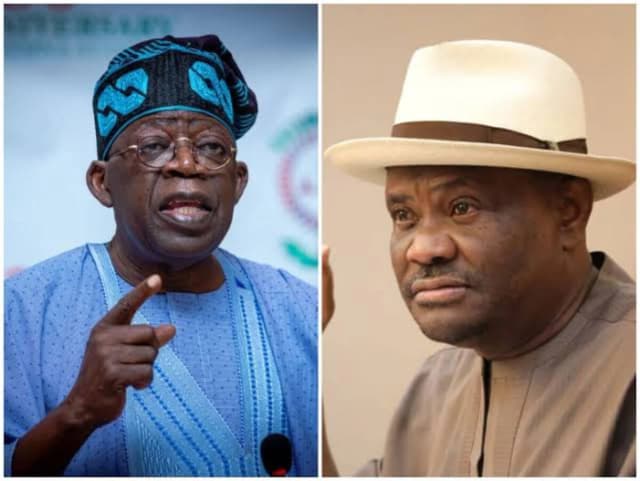
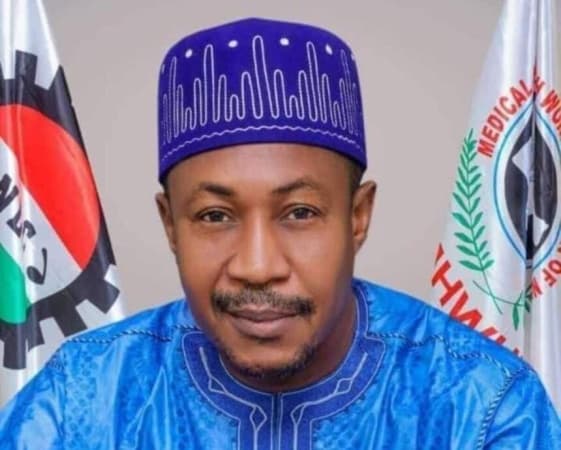
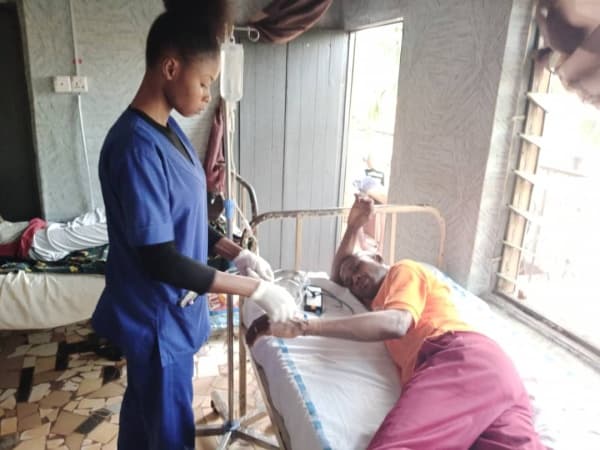


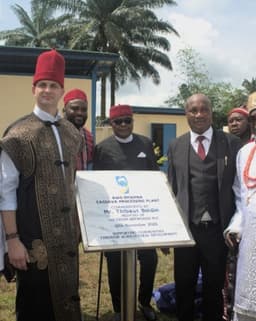
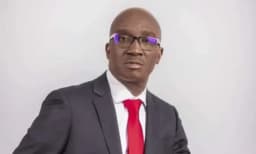





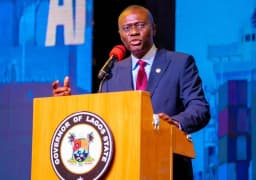





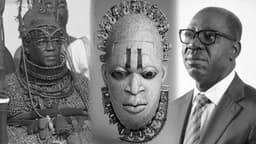
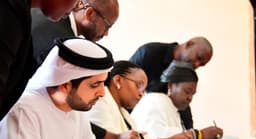




NEWS EXPRESS is Nigeria’s leading online newspaper. Published by Africa’s international award-winning journalist, Mr. Isaac Umunna, NEWS EXPRESS is Nigeria’s first truly professional online daily newspaper. It is published from Lagos, Nigeria’s economic and media hub, and has a provision for occasional special print editions. Thanks to our vast network of sources and dedicated team of professional journalists and contributors spread across Nigeria and overseas, NEWS EXPRESS has become synonymous with newsbreaks and exclusive stories from around the world.

Newly appointed APC National Chairman, Professor Yilwatda
By NWAMBU, GABRIEL, Ph.D
Abstract: This paper examines the potential implications of Professor Nentawe Goshwe Yilwatda’s appointment as the Chairman of the All Progressive Congress (APC) on the credibility of the Independent National Electoral Commission (INEC) in forthcoming Nigerian General Elections. Drawing upon his extensive background as an ICT Director, a former Resident Electoral Commissioner (REC) for INEC, and a Professor of Electrical Engineering, this paper argues that his unique skillset and prior engagements with the electoral system create a significant perception of compromised neutrality and impaired credibility for INEC. The analysis will delve into the specific reasons why this is unhealthy for Nigeria’s democracy, highlighting the possible dangers inherent in such a development, particularly in light of the 2023 presidential election’s “technical glitch.”
1. INTRODUCTION
The bedrock of any vibrant democracy is the integrity and impartiality of its electoral processes. In Nigeria, the Independent National Electoral Commission (INEC) is constitutionally entrusted with the critical responsibility of conducting free, fair, and credible elections. However, public trust in INEC has faced significant challenges, exacerbated by events like the “technical glitch” during the 2023 presidential election, which hindered the real-time upload of results (Form EC8A) to the IReV portal, leading to widespread skepticism and accusations of malpractices.
The recent emergence of Professor Nentawe Goshwe Yilwatda as the Chairman of the ruling All Progressive Congress (APC) introduces a complex layer to this already delicate landscape. Professor Yilwatda’s profile is notable for his convergence of technical expertise, direct electoral administration experience, and now, a pivotal partisan political role. This paper aims to critically analyze how this unique combination of attributes could potentially impair public perception of INEC’s credibility in future presidential and other elections, and why such a development is detrimental to democratic health.
2. Professor Nentawe Goshwe Yilwatda: A Confluence of Relevant Experiences,
Professor Yilwatda’s professional trajectory presents a compelling set of experiences that are directly relevant to the administration and integrity of elections:
ICT Director (Federal University of Agriculture Makurdi, 12 years):* This extensive background signifies a deep understanding of information and communication technologies, including network security, data management, system architecture, and troubleshooting. These are foundational skills for anyone involved in modern, technologically-driven electoral processes. He would be proficient in identifying system vulnerabilities, optimizing digital processes, and understanding data flow.
Resident Electoral Commissioner (REC, INEC Benue State, July 2017 – December 2021):* This is perhaps the most critical aspect of his resume for this analysis. As a former REC, Professor Yilwatda was an insider in the nation’s highest electoral management body. He would have possessed intimate knowledge of INEC’s operational modalities, its technological infrastructure (including the IReV and BVAS systems), result collation procedures, logistical challenges, and the internal safeguards and vulnerabilities within the system. His role would have involved overseeing elections at the state level, giving him firsthand experience with election day challenges and data transmission protocols.
Professor of Electrical Engineering: This title suggests a specialized focus on applying scientific and engineering principles to the design, implementation, and management .This underscores his theoretical and practical acumen in optimizing electoral systems, which, in a political context, can be viewed with both appreciation and suspicion.
Current Chairman, All Progressive Congress (APC):* This current role places him at the very heart of partisan politics, responsible for strategizing and leading the ruling party's efforts to win future elections.
3. The Shadow of the 2023 “Technical Glitch”
The 2023 presidential election’s failure to promptly upload Form EC8A results to the IReV portal remains a significant blot on INEC’s record. The commission’s explanation of a “technical glitch” was met with widespread skepticism, leading to accusations of deliberate manipulation and eroding public trust. This incident highlighted the fragility of technologically-driven electoral processes and the immense importance of real-time transparency in building confidence. The delay allowed room for suspicion that results were being altered before public dissemination, ultimately benefiting the ruling party.
4. How Professor Yilwatda’s Appointment Impairs INEC’s Credibility:
Professor Yilwatda’s unique blend of insider knowledge, technical expertise, and partisan leadership creates several avenues through which INEC’s credibility can be impaired, irrespective of actual intent:
Perception of Compromised Neutrality and Unfair Advantage:
Insider Knowledge as a Weapon: As a former REC, Professor Yilwatda understands INEC’s internal mechanisms, software, hardware, and human resources. He knows where the system is robust and where It might be susceptible to pressure or technical “anomalies.” This insider knowledge, now possessed by the chairman of the ruling party, can create a powerful public perception that the APC has an undue, unfair, and potentially exploitative advantage in future elections. It suggests that the "rules of the game" are no longer truly neutral, as one player has privileged insight into the referee’s equipment and methods.
Strategic Exploitation of Weaknesses: His “Electrical Engineering” expertise, combined with his ICT background, might lead to fears that he could guide the APC in identifying and strategically exploiting any systemic vulnerabilities within INEC’s technology or operational procedures. Even if no direct manipulation occurs, the public perception of such a capability severely undermines faith in the impartiality of the electoral outcome.
Erosion of Public Trust in Electoral Technology:
The “Technical Glitch” Reimagined: The 2023 “technical glitch” narrative gains a new, more sinister dimension with Professor Yilwatda’s appointment. Sceptics might now view such future occurrences not as accidental failings, but as deliberate outcomes orchestrated by someone with the technical know-how and partisan motivation. This pre-existing mistrust, amplified by his profile, makes it exceedingly difficult for INEC to credibly explain any future technical hitches.
Doubts about Data Security and Integrity: His ICT background, while valuable, ironically heightens concerns about data security and integrity when he is on the political side. Questions could arise about whether data protocols or system configurations previously managed or understood by him could be leveraged to influence outcomes, leading to a profound lack of trust in the authenticity of electronically transmitted results.
Chilling Effect on INEC Staff: Perceived Influence: Current INEC staff, especially those in ICT and operations departments, might feel an Indirect pressure or fear of reprisal, knowing that the chairman of the ruling party has an intimate understanding of their work and internal processes. This could subtly impact their independence and willingness to flag issues or resist pressure, even if unintended by Professor Yilwatda.
Loss of Operational Secrecy: Critical operational details, vulnerabilities, or even the design philosophy behind INEC’s systems, which should ideally remain confidential to prevent exploitation, might be perceived as compromised due to his prior access.
5. Why This is Unhealthy for Our Democracy: The Dangers
The scenario painted by Professor Yilwatda’s appointment carries significant dangers for Nigerian democracy:
Democratic Deconsolidation: When the public loses faith in the fairness of elections, it directly threatens the legitimacy of elected officials and institutions. If a significant portion of the populace believes that elections are predetermined or manipulated due to insider knowledge, it can lead to political apathy, disengagement, and a sense that democratic participation is futile. This erodes the very foundations of democratic consolidation.
Increased Political Instability and Violence: Perceived electoral injustice is a potent catalyst for social unrest and violence. If opposition parties and their supporters believe the electoral playing field is fundamentally tilted due to an “insider” advantage, it can lead to heightened tensions, protests, and a greater propensity for post-election violence, as seen in various parts of Nigeria’s history.
Erosion of Rule of Law: The expectation of a level playing field is central to the rule of law. When a political party’s chairman possesses such deep insider knowledge of the electoral umpire, it creates an appearance of a system where the rules can be bent or exploited from within, undermining the principle that all actors are equally subject to and protected by the law.
Difficulty in Attracting Quality Professionals to INEC: If the public perception solidifies that serving at INEC, particularly in sensitive roles, can later be leveraged for partisan political advantage, it could deter highly ethical and competent professionals from joining the commission, fearing that their expertise might be exploited or that their impartiality will be permanently tainted.
International Condemnation and Reduced Foreign Investment: International observers and development partners place high value on electoral integrity. A sustained perception of compromised electoral processes due to insider influence could lead to reduced international confidence in Nigeria’s democracy, potentially impacting foreign investment, aid, and diplomatic relations.
6. Conclusion and Recommendations
It is clear that Professor Nentawe Goshwe Yilwatda’s appointment as APC Chairman, given his unique professional background in ICT and as a former INEC REC, presents a significant challenge to the Independent National Electoral Commission’s perceived credibility in forthcoming General Elections in Nigeria. The inherent dangers of an individual with such deep insider knowledge leading a major political party in a democracy that has struggled with electoral trust cannot be overstated. It creates an unavoidable perception of an uneven playing field and an Increased potential for public suspicion around any future technical issues or electoral outcomes.
To mitigate these serious concerns and safeguard Nigeria’s democracy, the following considerations and recommendations are crucial:
Increased Transparency from INEC: INEC must redouble its efforts to be transparent in all its operations, particularly regarding technology. This includes pre-election testing, real-time result viewing (with robust and easily understandable explanations for any deviations), and public audits of its systems.
Strict Ethical Guidelines for Former Electoral Officials: There needs to be a robust national dialogue on stricter ethical guidelines and potentially “cooling-off” periods for high-ranking electoral officials before they can assume partisan political roles. Professor Nentawe by some strict laws should not join partisan politics at least for a minimum of 10 years after leaving INEC. This is critical to prevent the perception and potential reality of insider information being leveraged for political gain.
Enhanced Oversight and Accountability: Civil society organizations, the media, and international observers must intensify their oversight roles, particularly scrutinizing the technical aspects of elections and holding INEC accountable for absolute transparency.
Strengthening INEC’s Institutional Independence: Efforts to further strengthen INEC’s financial and operational independence from political influence are paramount, ensuring that the commission can truly act as an impartial arbiter.
Public Education and Confidence Building: INEC and civil society should engage in sustained public education campaigns to demystify electoral technology and processes, fostering informed public trust rather than blind faith or cynical distrust.
Ultimately, while Professor Yilwatda’s professional journey is a testament to his capabilities, its current convergence at the helm of a political party, given his intimate knowledge of the electoral system, poses a profound challenge to the integrity and public perception of Nigeria’s democratic process. Addressing this challenge requires proactive measures from all stakeholders to ensure that the electoral arena remains perceived as fair, transparent, and genuinely competitive.